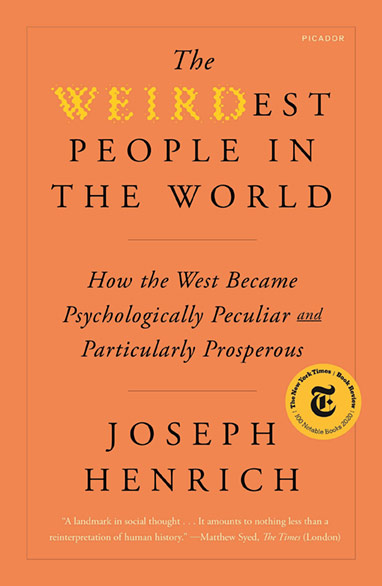Featured Book
The Weirdest People in the World
How the West Became Psychologically Peculiar and Particularly Prosperous
Featured Book
Literacy does strange things to you, and mass literacy does strange things en masse. Did you know that literate people have worse facial recognition abilities than those who are illiterate? Or that in learning to read and write your corpus callosum (the cable if you like connecting your right and left hemisphere) will have grown thicker?
Also you’ll be using a different hemisphere for processing language to anyone for whom the written word remains indecipherable – and this has repercussions on how you distinguish pseudowords from real ones (literate people are better at it).

These examples may sound a trifle academic but they serve to illustrate the main premise of Joseph Henrich’s new book, The Weirdest People in the World, namely that a culturally-driven activity like reading can physically alter your brain’s structure which will in turn impact on many other areas of your life.
Over the last twenty five years all areas of the social sciences have gradually adapted to the fact that the brain changes itself. It’s a highly plastic organ that keeps growing (learning is a physical thing) until we die. The old notion that the brain was some kind of computer you loaded up with stuff in childhood which you gradually forgot is simply wrong. The brain grows physical connections in response to use. When you learn to read you effect a big change in your brain. Similarly, people who meditate regularly or train to be London Taxi drivers (who have to memorise 1000s of routes) show very obvious physical differences in their brain structure. Genetic factors are obviously important, but inherited benefits cannot be utilised if the culture does not activate them. Culture is the doorway, and if it is closed no amount of genetic heft will open it.

If you are similar to me, then you were brought up weird. Or rather W.E.I.R.D. It’s a very useful and catchy acronym that Henrich coined; it stands for Western, Educated, Industrialised, Rich, Democratic. For various reasons which Henrich sets out to explain, Weird people are very strongly focused on achievement, goals, and personal success. Non-weird people are not. Non-weird concerns revolve around maintaining roles, responsibilities and relationships. Weird people are strongly individualistic and yearn to ‘be themselves’. Non-weird people alter their behaviour in order to get along with others. It’s something that anyone who has travelled or lived for anytime in, say, India, Japan or the Middle East already knows. The problem is unless you’ve experienced it you can’t convince a weird person that this is true. They may call it racism. They’re wrong. Henrich very emphatically states that his thesis is not about setting weird above (or below) non-weird – it’s about celebrating diversity. And that has to be a good thing.
But why should we believe Harvard professor Henrich, evolutionary biologist and anthropologist? Maybe because he has plenty of CRED (Credibility Enhancing Display) which is what humans need if they want to influence others (the CRED thesis is outlined in an earlier work by Henrich). He also reminds us research has shown humans are sadly status seekers and are strongly influenced by prestige. So luckily he teaches at Harvard. But alongside all this he also builds a very meticulous argument showing how small changes in the last 1000 years have led to a sort of schism between the weird world and the rest. And the non-weird ‘rest’ are the majority, both now and very much so in the past.
Small changes in the last 1000 years have led to a sort of schism between the weird world and the rest.
One of the symptoms of being weird, part of the mindset, is to believe that everyone else resembles you (except they may be stupider, etc). So you can see the problem. Weird people, though very successful at maths and inventing and making money, are prone to go astray when they study the world. In fact they generalise both from their own experiences (narrow) and from the pool of research students they perform experiments on (who are also weird). The tests which weird psychologists have been running since Pavlov started tormenting dogs have, latterly and in the main, been conducted on US undergraduates in US institutions of learning. The results have been used to devise a picture of mankind which books and lectures and research programs have projected from psychology to anthropology to economics to journalism. This leads us to the troubling inference that the major works of the social sciences we have all been reading in the last 100 years are simply limited and in many cases plain wrong. It’s lucky Henrich has CRED because this is explosive stuff. What will go bang? The Western Intellectual Tradition (WIT) sense of self-importance for one thing.
Weird people, though very successful at maths and inventing and making money, are prone to go astray when they study the world.
The Weirdest People in the World both shows the differences (using lots of research and experimental data) between weird and non-weird people and then goes on to explain it. You can take one without the other, or you can reserve some judgment on the explanation without throwing away the immensely precious notion that being WEIRD is, actually, pretty weird and not normal as far as much of the world operates.
Let’s look more closely at one difference. As we have noted in passing, Weird people think everyone thinks like they do (the weirdest, apparently, according to the author’s tests are US undergraduates, followed by Americans, Brits, Netherlanders and Australians). The reason for this, and the consequent over-focusing on inner motivation rather than external behaviours lies in the over-valuing of an ‘inner self’ who is somehow ‘in command’. Imagining that there is some ‘mini-me’ inside giving commands to the ‘big-me’ the world sees is not universal. Most of the world doesn’t run like that, and never has. The Weird mindset is new, highly efficient materially, but its belief in an essentially free and pure inner self means that we misunderstand non-weird people. It also has mental health consequences: weird people give themselves a much harder time because of this idealised inner self. We all do things we know are wrong, subconsciously motivated or simply random and yet we cling to the notion our inner voice is ‘in control’. Our little man or woman is also gnawing away and telling us we need to achieve our potential, ‘be ourselves’, aspire to greatness. In the rest of the world (Henrich has clever (admittedly weird) tests that prove all this) people do things to fulfil a responsibility or benefit relationships within their family or tribe. Naturally they like money and power as much as the next man, or woman, but they aren’t focusing on it like they are focusing on their group surroundings. Their ‘inner voice’ is the voice of the group, mainly. In this sense, ‘getting on with their lives’, can never be seen as – in the final analysis – a failure, whatever the material result. Coming second or even last is not failure as long as you have maintained your relationships and your family. Lose those and you are nothing. An estranged millionaire alone in his sky-high apartment is weird indeed.
Weird people think everyone thinks like they do.
The explanation that Henrich advances for the huge difference between weird humans and the rest hinges on kinship. Intuitively this makes sense as non-weird people are much more attuned to relationships and responsibilities. In the world, the whole world, not just the weird world, marriage is a family affair. And I don’t mean that indirectly. One in ten people are married to a cousin or some other relative. Now think, how many people you personally know who are married to a relative of some sort? My guess is zero. Because you, like me, are weird. And weird people don’t marry people they are related too. Weird people marry people they meet online or in a large nightclub or even a small one.
Non-weird people are much more attuned to relationships and responsibilities.
Now, when Europeans started to prohibit marriage to cousins this seemingly tiny difference changed the entire world. According to the evidence of the author, since the beginning of Christianity as an institutionalised religion – from the 5th century onwards – the Christian religion has systematically prohibited cousin marriage. At some point it prohibited marriage to cousins even six stages removed. For hundreds of years marriage to anyone closer than a third cousin was not allowed by the Catholic church (interestingly the Coptic and other Eastern churches didn’t pursue this course). Catholicism then morphed into Protestantism which Henrich identifies as an even greater brake on kinship involvement. Why, you might ask, get all concerned about marrying even distant cousins? Henrich does not try to answer this tricky question. One might equally observe that Pythagoras forbade his disciples from eating beans– we don’t need to know why, he just did. Catholics may have had their very good reasons, or they may not, but the fact remains family ties were slowly weakened when people had to increasingly look to the out-group for a potential spouse. And it is this courting, literally, of people who are not related to you, that lead to all sorts of micro-cultural changes that over time have caused the weird mindset.
When Protestantism lurched into existence in the 15th century Weird really began to accelerate. The causes were many and complex, but Henrich focuses on the growth of non-kinship groups such as monasteries, guilds and trade associations that fostered notions of increasing universality (measurement of time being one) and self-reliance. Note that literacy does not appear to lead to Protestantism, but becoming a protestant is a very keen driver of acquiring literacy (Henrich proves this using clever data from Prussia). The reason is simple: your relationship to God is mediated through a book and no longer through a priest. Now, for Muslims this had been true for many centuries already. But the Islamic tradition of memorising the Koran meant that actually having to read it was not essential. In Europe, gently rising literacy (driven by guilds and increasing trade) may have levelled off without the Protestant supercharge. Once a place in the afterlife may well depend on being able to read, the incentive to acquire literacy was powerful indeed.

And literacy is one of the major drivers of the Weird revolution. We’ve seen that it changes the brain; it even affects such things as marksmanship (contrary to notions of brigand marksmen, the more literate you are the more accurate your shooting ability). Literacy in the non-weird world, and historically the whole world, never crept above 10% of the population. But once Protestantism came about, the 80-90% literacy seen in the Netherlands and England came about and later spread to the United States.
Sufi thinker Idries Shah made many points which are echoed by Henrich’s findings or flesh them out. One is his constant assertion that attention exchange is crucial to human health. We can see that being weird means a greater potential attention exchange – through an enlarged social network – but also a greater possibility for isolation due to weird notions of individualism. Non-weird kinship based societies offer greater attention possibilities albeit at a more mundane level. Fast forward to the 21st century and the weird world is not doing so well when it comes to getting attention. An increasingly online world does not favour the isolated. Whereas kinship based communities remain resilient in this area.
Shah also highlighted the need to balance the overly ‘left brain’ approach – essentially the weird mentality – in many of his books. His re-introduction of the teaching story to the West along with the joke figure of Mulla Nasrudin can be seen as attempts at refining and balancing the weird tendencies we all are now born with.
We may be born into a weird world, then, and we have seen how it alters our brains – but things are evolving in different directions. Literacy, though high, is declining in many parts of the most staunchly weird world. Youth gangs proliferate. The formerly widespread and very definitely Protestant work ethic with its values of objectivity and freedom of expression are under direct attack. When it goes, we go; or rather, WEIRD does. And we are seeing it already: the growth of identity politics that polices our language to create tribal identities. The loss of faith in objective measures like freedom of speech in favour of groups with victim status. The new politicians who lie fluently and break age old traditions (ie a few hundred years old) of impartiality to revel in promoting family and close friends to positions of power. Perhaps we are seeing a return to the kinship world and getting a little less weird.
This review first appeared in ISF Perspectives, the digital magazine of The Idries Shah Foundation. All views expressed are those of the reviewer.
In the series: Our Mind in the Modern World
- An Ancient Brain in a Modern World
- Our Unconscious Minds
- Maintaining a Stable World
- The Multiple Nature of Our Mind
- Connecting with Others
- Morality’s Long Evolution
- Unconscious Associations
- The Brain’s Latent Capacities
- God 4.0
- Multimind: A New Way of Looking at Human Behavior
- Thinking Big
- Social
- The Righteous Mind
- New World New Mind
- Moral Tribes
- The Mountain People
- The Matter with Things
- Humanity on a Tightrope
- Beyond Culture
Further Reading »
External Stories and Videos

Watch: Who Are “The WEIRDest People in the World?”
A PBS interview with Joseph Henrich
Are human behavioral studies giving us the complete picture? Joseph Henrich says no. As a Harvard professor of evolutionary biology, he argues that our understanding of human nature is skewed by the fact that the vast majority of people who volunteer to take part in studies are educated Westerners, who remain a psychologically peculiar crop.

